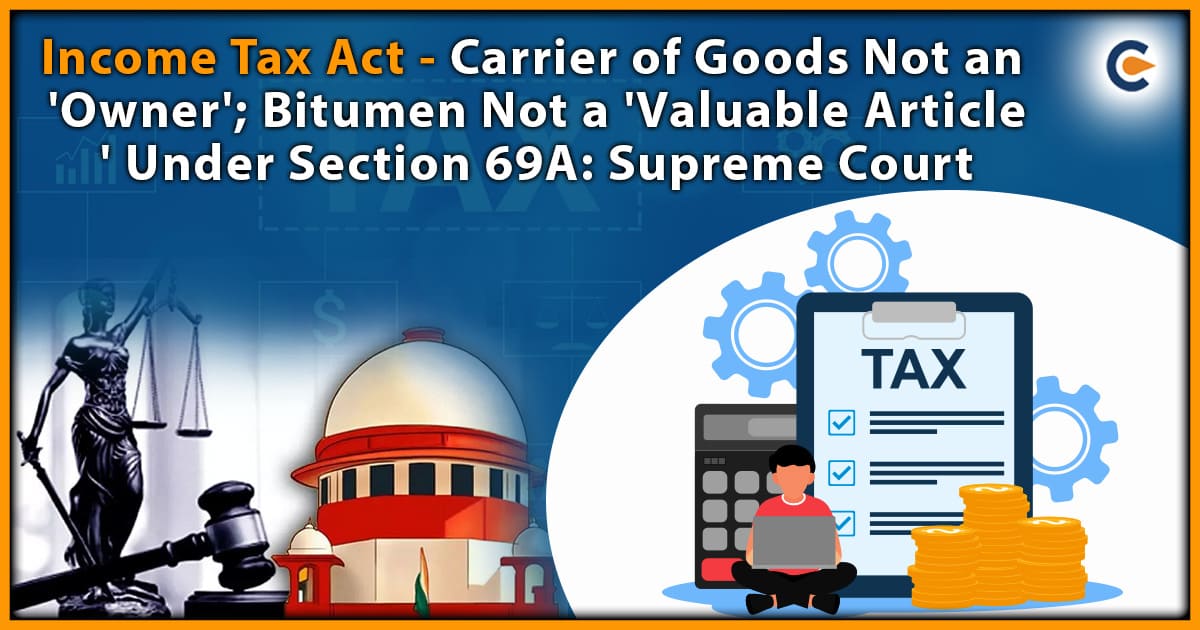Section 69A of the Income Tax Act is a significant provision that addresses tax implications related to goods ownership and the classification of valuable articles. It plays a crucial role in determining tax liabilities for individuals and businesses. This section distinguishes between carriers of goods and owners, ensuring accurate taxation based on ownership. If a person is recognized as a carrier, they may be exempt from certain taxes imposed on owners. However, if they are deemed the owner, they will be subject to applicable tax obligations. Additionally, Section 69A defines valuable articles and their treatment for tax purposes, which is particularly relevant when assessing tax liabilities associated with high-value assets. Understanding this section is essential for accurate compliance with tax regulations and obligations.
The Supreme Court of India recently rendered a significant ruling regarding the classification of bitumen as a valuable article under Section 69A of the Income Tax Act.
The case revolved around a disagreement between a taxpayer and the Income Tax Department concerning the taxable status of bitumen, a widely used substance in the construction of roads. The question before the court was whether bitumen could be considered a valuable article for the purposes of Section 69A, which deals with deemed income in certain cases. The court’s decision has far-reaching implications for the taxation of bitumen and similar materials under the Income Tax Act. It impacts the parties involved in the dispute and establishes a precedent for the taxation of bitumen in future assessments. The ruling provides clarity on the application of Section 69A and its interpretation concerning valuable articles. Consequently, it will guide tax authorities, taxpayers, and businesses in determining the tax implications and obligations associated with bitumen and similar assets under the Income Tax Act.
Section 69A Of the Income Tax Act
Section 69A of the Income Tax Act is a provision that deals with deemed income in certain cases where the income or investments of an individual or entity cannot be satisfactorily explained. It empowers the Assessing Officer to add to the assessee’s taxable income based on unexplained investments, expenditures, or assets.
The key features and implications of Section 69A are as follows:
- Deemed Income: Section 69A enables the Assessing Officer to treat unexplained investments, expenditures, or assets as deemed income of the assessee. It means that if the assessee is unable to provide a satisfactory explanation for the source of such investments or assets, they can be added to the assessee’s taxable income.
- The burden of proof: lies with the assessee to provide a satisfactory explanation for the unexplained investments, expenditures, or assets. If the assessee fails to do so, the Assessing Officer may treat them as taxable income.
- Valuable Articles: Section 69A applies specifically to “valuable articles” owned by the assessee. While the Act does not define the term “valuable articles,” courts have interpreted it to refer to assets or items of significant value, such as jewellery, bullion, artwork, or other high-value possessions.
- Addition to Taxable Income: If the Assessing Officer determines that the assessee owns valuable articles that have yet to be satisfactorily explained, the value of such articles can be added to the assessee’s taxable income. This leads to an increase in the tax liability of the assessee.
- Applicability and Penalties: Section 69A is applicable to both individuals and entities, and the additions made under this provision are subject to applicable tax rates and penalties as per the Income Tax Act. The provisions of Section 69A aim to deter tax evasion and ensure that unexplained wealth or assets are brought to taxation.
Classification And Taxation of Bitumen
- Bitumen, a widely used material in road construction, has sparked discussions regarding its classification and taxation under the Income Tax Act. The focus is on Section 69A, which addresses deemed income and the classification of valuable articles.
- Proponents of classifying bitumen as a valuable article argue that it possesses intrinsic value, as it is a crucial component in road construction and has significant economic importance. They contend that its inclusion in the deemed income provisions would help ensure that its production, sale, and use are appropriately accounted for and taxed.
- Opponents of this classification may argue that bitumen needs to fit the traditional understanding of a valuable article. They may argue that it is a raw material rather than a finished product, and its value lies in its utility rather than its inherent worth. Additionally, they may contend that taxing bitumen under Section 69A could lead to potential complications and challenges in implementation and enforcement.
- The disagreement centres around whether bitumen qualifies as a valuable article within the context of Section 69A. Tax authorities argue that bitumen should be considered valuable, subjecting transporters to additional tax liabilities for any undelivered or misappropriated quantities. However, transporters maintain that bitumen should not fall under the category of valuable articles, as they do not claim ownership over it but possess it through a contract of bailment[1].
- To resolve this matter and provide clarity, the Supreme Court was approached. The court’s decision holds significance not only for the tax liabilities of transporters but also establishes a precedent for the treatment of similar materials under the Income Tax Act.
- This situation surrounding bitumen underscores the importance of precise definitions and interpretations in tax legislation. It highlights the need for courts to carefully analyze each case’s legislative intent and specific circumstances to ensure a fair and equitable resolution. The Supreme Court’s ruling will shape the taxation of bitumen and provide guidance for future cases involving the taxation of similar materials.
Background Of the Case
- The background of the case involves an assessee who operated as a carriage contractor for bitumen. In the course of their business, they were involved in a scam where they misappropriated the bitumen and failed to deliver the entire quantity to the various Divisions of the Road Construction Department under the Government of Bihar. This discovery was made when it was found that the actual quantity of bitumen delivered fell short of the claimed quantity.
- As a result, the Assessing Officer (AO) took action by invoking Section 69A of the Income Tax Act. This section allows the AO to make additions to the assessee’s income in cases where the income cannot be satisfactorily explained. In this particular case, the AO added the shortfall in the supply of bitumen as deemed income under Section 69A, leading to potential tax liabilities for the assessee.
- With the dispute arising from the Assessing Officer’s decision, the case eventually made its way to the Supreme Court of India. The Supreme Court was tasked with examining the relevant facts, legal arguments, and interpretations to determine the appropriate course of action in accordance with the provisions of the Income Tax Act. The court’s ruling would have significant implications for the parties involved and future cases concerning misappropriation, short supply, and taxation of goods under Section 69A of the Income Tax Act.
Supreme Court’s Analysis and Decision
- The Supreme Court examined a situation where the transporter assessee had engaged in a scam involving the misappropriation of bitumen and the failure to deliver the complete quantity to the Government Department. The court observed that the assessee had never claimed ownership over the undelivered bitumen and that their possession of the bitumen was akin to that of a bailment arrangement, which was only slightly better than that of a thief.
- The court emphasized that recognizing the assessee as the owner of the bitumen would be an unjust and illegal interpretation of the law. Section 69A of the Income Tax Act targets income that has not been recorded in the books of account but belongs to the assessee. However, this provision applies to other valuable articles the assessee owns.
- Applying the principle of ejusdem generis, the court concluded that bitumen did not fit within the category of valuable articles contemplated by Section 69A. As a residual product primarily used in road construction, bitumen lacked the characteristics of a valuable article under the provision.
- The court further ruled that if considering bitumen as a valuable article required ownership in large quantities and multiplying its value, it would not meet the criteria of being a valuable article. Consequently, the Assessing Officer’s Act of treating the assessee as the owner and making additions to their income under Section 69A based on this erroneous assumption was deemed illegal.
- The Supreme Court’s analysis involved a careful examination of the provisions of Section 69A, the nature of the transaction, and the intent of the legislation. Their decision clarified the interpretation and implications of Section 69A regarding the ownership and taxation of bitumen in cases of short delivery or misappropriation. This ruling not only impacted the tax liability of the assessee but also had the potential to establish a precedent for similar cases in the future.
Impact Of the Supreme Court Ruling
The Supreme Court ruling in this case regarding the classification of bitumen as a valuable article under Section 69A of the Income Tax Act has significant implications and impact.
Here are some of the key impacts of the ruling:
- Clarification of Tax Liability: The ruling provides clarity on the tax liability of transporters involved in the carriage of bitumen. By determining that bitumen does not qualify as a valuable article under Section 69A, the court sets a precedent for similar cases, ensuring that transporters are not subjected to additional tax burdens based on an incorrect interpretation of the law.
- Protection against Unjust Taxation: The ruling safeguards transporters from unjust taxation. It recognizes that possession of bitumen by the transporter, under a contract of bailment, does not equate to ownership. Therefore, the transporter should not be treated as the owner for tax purposes. This ensures that transporters are not unfairly burdened with tax liabilities for goods they do not own.
- Legal Certainty: The Supreme Court’s ruling provides legal certainty and guidance on the interpretation of Section 69A. By applying the principle of ejusdem generis and analyzing the characteristics of bitumen, the court clearly understands what constitutes a valuable article under the provision. This clarity helps taxpayers and tax authorities in interpreting and applying the law correctly.
- Precedent for Future Cases: The ruling sets a precedent for future cases involving the classification of goods as valuable articles under Section 69A. The court’s analysis and decision can serve as a reference point for similar disputes, providing guidance to lower courts and taxpayers in determining the tax implications of different types of goods and possessions.
- Impact on Tax Administration: The ruling may have implications for tax administration and enforcement. It emphasizes the importance of accurately determining ownership and possession in cases of deemed income under Section 69A. Tax authorities may need to review their practices and procedures to ensure proper evaluation and assessment of cases involving the possession and ownership of goods, especially where there are allegations of short delivery or misappropriation.
Overall, the Supreme Court’s ruling brings clarity, fairness, and consistency to the interpretation and application of Section 69A in relation to the taxation of bitumen and similar goods. It directly impacts transporters’ tax liabilities and sets a precedent for future cases, providing guidance and legal certainty in this area of taxation.
Conclusion
The Supreme Court’s ruling on the classification of bitumen under Section 69A of the Income Tax Act clarified that bitumen does not qualify as a valuable article. The court emphasized that the assesse did not claim ownership over the undelivered bitumen, and their possession was considered no better than that of a thief. Recognizing the assesse as the owner would be unjust and contrary to the legislative intent of Section 69A. The court applied the principle of ejusdem generis and concluded that bitumen, being a residual product used in road construction, does not meet the criteria of a valuable article. This ruling has significant implications for the taxation of bitumen, providing clarity and protection for transporters. It ensures that possession under a contract of bailment does not establish ownership for tax purposes. Overall, the Supreme Court’s interpretation brings fairness and consistency to the tax system, ensuring accurate determination of tax liabilities in line with the legislative intent.
Read our Article:Section 44AE Income Tax Act, 1961 – Presumptive Taxation Scheme











